 'Jin' named the word of the year by cross-strait netizens
'Jin' named the word of the year by cross-strait netizens Chinese scientific expedition goes to build new Antarctica station
Chinese scientific expedition goes to build new Antarctica station
 Chinese naval escort fleet conducts replenishment in Indian Ocean
Chinese naval escort fleet conducts replenishment in Indian Ocean 17th joint patrol of Mekong River to start
17th joint patrol of Mekong River to start China's moon rover, lander photograph each other
China's moon rover, lander photograph each other Teaming up against polluters
Teaming up against polluters
TOKYO, Dec. 30 -- Chinese Ambassador to Japan Cheng Yonghua has strongly blasted Japanese Prime Minister Shinzo Abe's visit to the notorious war-linked Yasukuni Shrine.
In a signed article titled "Wrong place to make a pledge against war," published in Japanese newspaper Mainichi Shimbun on Monday, Cheng said Abe's argument that his shrine visit was "a pledge that Japan would never go to war again" was unconvincing.
Abe had chosen the wrong place to declare his pledge against war, said the article.
Before World War II, the Yasukuni Shrine served as spiritual attachment for Japanese militarism in its wars of aggression. Today, the facility, which enshrines Class-A war criminals of WWII, whitewashes Japan's history of aggression and disseminates an erroneous historical view against world opinion, read the article.
Cheng said Japan might have its own understanding of life and death and religious views, but that should not serve as an excuse for Japanese leaders to worship the evil-doers, including Class-A World War II war criminals.
Once dead, the criminals would suddenly become worshippable and their crimes would be written off? People do not understand the logic, read the article.
"We have never heard of any political claim in Germany that war maniacs including Adolf Hitler have redeemed their guilt by death," Cheng wrote.
Abe stressed after the visit that he had "no intention to hurt the feelings of the Chinese and the South Korean peoples." Yet his visit to the war shrine has brought back memories of the atrocities of Japanese aggressors among the Chinese people and people of other Asian nations, said the article.
Shrine visits by Japanese government leaders bear on Tokyo's understanding of and attitude toward the war, bear on the political foundation for post-war restoration of and improvement in relations between China and Japan, bear on the feelings of the victims of Japanese aggression in WWII, and bear on the path of Japan's development in future, Cheng wrote.
Abe's visit to the Yasukuni Shrine is by no means just a matter of domestic or personal affairs, said the article. Instead, it is definitely a political and diplomatic issue.
The article reiterated that China deems Abe's shrine visit unacceptable and called on Japanese leaders to truly commit to peaceful development and truly live in peace with neighboring countries.
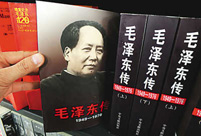 Commemorate 120th birth anniversary of Mao Zedong
Commemorate 120th birth anniversary of Mao Zedong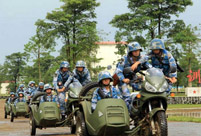 Female soldiers of PLA Marine Corps in training
Female soldiers of PLA Marine Corps in training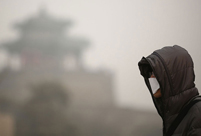 Chinese cities to have a very grey Christmas as smog persists
Chinese cities to have a very grey Christmas as smog persists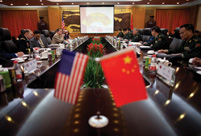 China and U.S. - the national image in each other’s eyes
China and U.S. - the national image in each other’s eyes The Liaoning's combat capability tested in sea trial
The Liaoning's combat capability tested in sea trial Chinese pole dancing team show their moves in snow
Chinese pole dancing team show their moves in snow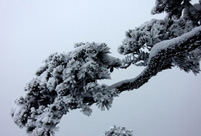 Rime scenery in Mount Huangshan
Rime scenery in Mount Huangshan Ronnie O'Sullivan: My children mean the world to me
Ronnie O'Sullivan: My children mean the world to me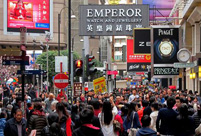 Shopping in Hong Kong: a different picture
Shopping in Hong Kong: a different picture The buzzwords in 2013
The buzzwords in 2013 Top 10 domestic news of 2013
Top 10 domestic news of 2013 Red crabs begin annual migrations in Australia
Red crabs begin annual migrations in Australia Artifacts retrieved from West Zhou Dynasty
Artifacts retrieved from West Zhou Dynasty Aftermath of Volgograd railway station blast
Aftermath of Volgograd railway station blast Fleet hits targets in training
Fleet hits targets in trainingDay|Week|Month